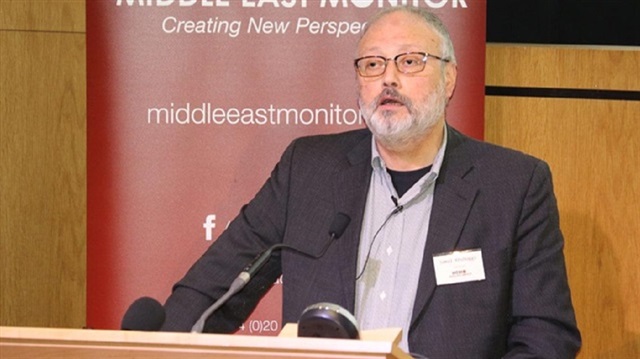
Saudi dissident alluded to range of critical regional issues before going missing on October 2
Jamal Khashoggi, the Saudi dissident who went missing last week after entering the Saudi consulate in Istanbul, tweeted about a range of critical regional issues in the days leading up to his (as-yet-unexplained) disappearance.
Along with the Palestine-Israel issue, the crisis in Syria, and Iranian intervention in the Arab world, Khashoggi also alluded to U.S. President Donald Trump’s recent suggestion that Saudi Arabia pay the U.S. for the protection it provides.
After taking part in a pro-Palestine seminar in London, Khashoggi tweeted on Oct. 1 (only one day before his disappearance): “I am leaving London and Palestine is still on my mind. I attended a conference where I met [pro-Palestinian] researchers and activists from all over the world who believe in the justice of their cause”.
He added: "Despite the power of the Israeli lobby [in the U.K.] … the voice of Palestine is still loud here. They are trying to marginalize the Palestinian cause … but it remains ever-present in the popular conscience."
Khashoggi also tweeted several times about the arrest of his friend Essam al-Zamel, a prominent Saudi businessman and economy expert, by the Saudi authorities.
"Essam doesn't deserve such treatment,” Khashoggi asserted. “The accusations leveled against him don’t convince anyone!"
The Saudi authorities accuse al-Zamel -- an outspoken critic of Crown Prince Mohamed bin Salman’s “reform” initiative -- of maintaining covert affiliations with the Qatari government (with which Riyadh severed relations last year) and of having links to the Muslim Brotherhood (which Riyadh considers a “terrorist group”).
Late last year, the Saudi authorities detained dozens of people -- including a number of princes and cabinet ministers (both former and current) -- in a massive "anti-corruption" sweep.
Saudi billionaire investor Prince Alwaleed bin Talal and Prince Miteb bin Abdullah, minister for the Saudi National Guard, were among those rounded up.
Only two months earlier, the Saudi authorities had launched a campaign targeting several Saudi intellectuals and Muslim scholars, including Salman al-Awda, Safar al-Hawali and Ali Al-Omari.
In the days leading up to his disappearance, Khashoggi had also tweeted about his country’s dwindling role in Syria and alleged plans by the Saudi leadership to normalize ties with the Assad regime.
"Those who want to restore the Arab role in Syria should not do so through an Iranian ally [i.e., the Assad regime], which has forfeited its legitimacy and relinquished [the country’s] sovereignty...," Khashoggi tweeted on Sept. 30.
Saudi Arabia had been one of the main supporters of the Syrian uprising that began in 2011 and which later erupted into full-blown conflict -- involving numerous regional and international actors -- after the Assad regime cracked down on protesters with unexpected ferocity.
In a Sept. 27 tweet, Khashoggi urged the Saudi leadership to review its Syria policy, saying that “the only way to get Iran out of our [Arab] world is to support the Syrian revolution and a pluralistic system in Yemen”.
For the past three years, Saudi Arabia -- at the head of an Arab military coalition -- has been fighting a destructive war with Shia rebels in Yemen who Riyadh accuses of serving as Iranian proxies.
Khashoggi also urged the Saudi leadership to support the "the Arab people’s desire for freedom”.
As for Trump's recent suggestion that the Saudi regime pay for the protection the U.S. provides, Khashoggi tweeted: "Trump himself is the biggest threat."
In another tweet, Khashoggi voiced his belief that the “biggest threat” facing the Gulf States and their oil “is a president like Trump, who sees us merely as a source of oil”.
Since Khashoggi went missing on Oct. 2, speculation has mounted that he was killed by the Saudi authorities, who have yet to provide a convincing explanation for his disappearance.
Meanwhile, several countries -- including Turkey, the U.S. and the U.K. -- have continued to press Riyadh for clarification.
According to Khashoggi’s Turkish fiancée, Hatice Cengiz, he first visited the Saudi consulate in Istanbul on Sept. 28.
After being told his documents would be ready after one week, Khashoggi briefly visited London before returning to Istanbul on Oct. 1.
The following day, he entered the consulate and has not been seen since.
On the same day as his disappearance, 15 Saudi officials arrived in Istanbul, where they went to the consulate while Khashoggi was still presumably inside, according to Turkish police sources.












